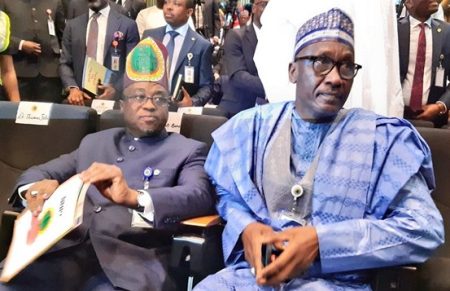 14 October 2012, Sweetcrude, TOKYO – NIGERIA’s Finance Minister and co-ordinating minister for the Economy, Dr Ngozi Okonjo-Iweala, on Sunday in Tokyo reiterated the need to retain 75 dollars as the reference price of a barrel of oil in executing the country’s 2013 budget.
14 October 2012, Sweetcrude, TOKYO – NIGERIA’s Finance Minister and co-ordinating minister for the Economy, Dr Ngozi Okonjo-Iweala, on Sunday in Tokyo reiterated the need to retain 75 dollars as the reference price of a barrel of oil in executing the country’s 2013 budget.
She told newsmen that the budget for next year presented to the National Assembly by President Goodluck Jonathan last week which had 75 dollars as benchmark for a barrel of oil was so designed to maintain macro stability.
Okonjo-Iweala was speaking at the sideline of the on-going annual meeting of the International Monetary Fund, IMF, and the World Bank.
She said many considerations had been made based on the analysis of the economy before arriving at the benchmark.
“We believe and we have seen analyses by those who look at Nigeria internationally that the budget Mr. President just presented indeed provides the fiscal basis for stability, going forward.
“That means that the benchmark price of oil that we have proposed gives us enough room to spend without going too far.
“That the focus of concentrating expenditures in the budget on infrastructure, on agriculture, on security, on opening up all those bottlenecks that are constraining the economy, that that is the right focus,” she said.
Okonjo-Iweala said Nigeria was doing the right thing on macro stability and that there would be no need to lose focus.
She said that Nigeria must avoid anything that would disturb fiscal measures, noting that the ministry would continue to work with the various committees of the National Assembly to streamline issues of concern already raised.
“The House of Representatives said that they have passed the Medium Term Expenditure Framework at 80 dollars per barrel; the Senate has made no pronouncement on the issue of benchmark, so I don’t know the true position of the National Assembly.
“But I believe that what I have heard from the Senate is that they believe that 75 dollars is a reasonable price. We are working with all the various committees, both in the Senate and in the House,’’ she said
She assured the provision of logical reasons for the oil price to be maintained at 75 dollars per barrel.
Okonjo-Iweala noted that the benchmark was not concocted, but was formed based on fundamental economic analysis, adding that Nigeria also had a module it had been using over the past few years.
“We have to have an approach, because if we do it in an arbitrary fashion that means that at any point in time, you don’t have the basis to defend why it is this number as opposed to the other number.
“So, we are very much trying to discuss with our colleagues; we understand the issue that they want to reduce the deficit, they want to spend more; we have addressed the issue of spending more, we think we’ve given enough room.
“Actually the figure should have been 72 dollars a barrel and to give country the room to spend more, we adjusted the module a little bit and took 75 dollars to allow that little bit of a buffer and accommodate their concerns.”
She noted that jacking the benchmark up to 80 dollars per barrel would take the economy in a direction that would be unhealthy.
Also, Malam Sanusi Lamido Sanusi, the CBN Governor, said that increasing the benchmark would not increase revenue for government.
“Increasing benchmark does not increase government revenue; government revenue comes from how much oil you sell and at what price.
“Increasing the benchmark just increases the amount of money that is going to be spent and I think it’s important to remember that.’’
Sanusi said that the work to be done was to ensure that the Nigerian National Petroleum Corporation, NNPC, performed well, adding that if NNPC produced copiously from deep offshore oil fields, government’s financial commitment to oil production would reduce.
“If we have leakages from illegal bunkering, that hurts government’s revenue. We need to look at what finance is doing, increasing the benchmark is not the solution; the solution is to plug those loopholes.
“And I told the National Assembly not to focus on moving the benchmark from 75 dollars a barrel to 80 dollars a barrel, because what you are looking at additional five dollars a barrel, you are getting much more by stopping illegal bunkering, increasing transparency and accountability at the NNPC,” he said.
These, he said, would help the nation more than increasing the oil price benchmark to 80 dollars per barrel.



